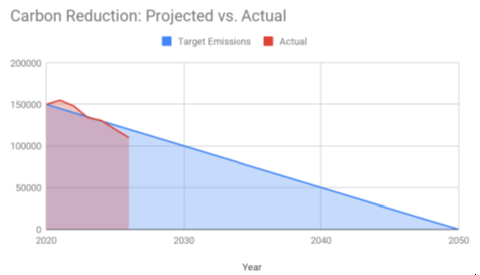
After reaching our core goal of becoming carbon-neutral by 2024, we are dedicated to achieving Net-Zero Climate Impact by the end of 2035, with a stretch goal of 2030.
We plan to accomplish this by taking action to decarbonise our operations, reduce waste and collaborate with external stakeholders.
At Freshminds, we recognise the significance of the global environmental issues that we currently face, as well as our responsibility to address them. Tackling climate change has become a global strategic challenge, and we are working to improve business operations to help protect the planet.
We are dedicated to reducing our environmental impact and contributing to a more sustainable future. In an increasingly climate-conscious world, driving our business with a sustainable mindset will allow Freshminds to deliver value to our clients, ensure a strong future for the business and care for the environment.
We are committed to aligning our daily operations with sustainable practices. With this in mind, we are dedicated to achieving Net-Zero Climate Impact by the end of 2035, with a stretch goal of 2030. We project that our carbon emissions will decrease over the next five years to 3 tCO2e by 2030. This is a reduction of 36%. We plan to continue to do this by focusing on the three main pillars below.

1) Carbon Reduction
We understand the negative impact that carbon emissions have on the planet, and we are taking the necessary steps to develop a carbon reduction plan as a part of our net-zero commitment.
We are targeting carbon reduction at every level of the business, starting with an in-depth review of our energy usage to identify areas where we can reduce our carbon consumption. We are also implementing technology and other office practices to reduce our carbon footprint.
Where we are not able to eliminate emissions, we are investing in carbon reduction projects to offset our remaining carbon consumption. We continually consider independent verification of such projects to ensure that our investments are having the greatest possible effect in tackling climate change. We project that carbon emissions will decrease over the next five years to 3 tCO2e by 2030. This is a reduction of 36%.
The below illustration indicates the progress made to date. The carbon emission reduction achieved by our projects and schemes equate to 0.2 tCO2e, a 5% reduction against the 2023 baseline.

Completed carbon reduction initiatives since the 2023 baseline include the implementation of: our Cycle to Work scheme; an Electric Vehicle Scheme with Octopus EV; virtual meetings and hybrid working (3 office days per week); full office waste recycling.
More detail on progress against our carbon emissions target and more information about our programmes can be found here.
2) Reducing Waste
We are focused on reducing waste in our day-to-day operations, taking action through infrastructural implementation and alteration in office practices. We are working towards achieving water neutrality and ensuring we are reusing and recycling whenever possible, whether that be office supplies or food wastage.
We also aim to ensure that zero waste will go to landfill by engaging First Mile, a waste management provider with a zero-to-landfill commitment. We have also identified infrastructural implementation as the area where we can make the largest difference to our waste production and have already started making infrastructural changes.
3) Supply Chains, Partnerships & Awareness
We have a strong culture of environmental awareness. The environmental consciousness and commitment of each Freshminds employee is essential in ensuring the company meets its sustainability goals. We will continue to support our employees in this effort by providing tools and training on how we can each contribute to the sustainable operation of the business. We will promote environmental efforts through charity work to give each employee the opportunity to be involved and promote positive change.
In addition, we will also be more selective with the suppliers we partner with, establishing criteria for suppliers that we use to ensure they align with our expectations on environmental consciousness and building more sustainable business practices.